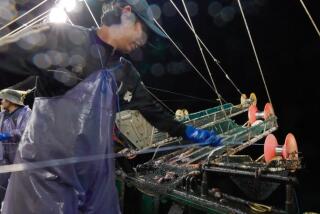Controversy Over Whaling
- Share via
Richard Mott’s charge of “ecological piracy” leveled against Japan (Commentary, Feb.12)proves that there are few topics as emotionally charged and factually distorted as whaling.
When the U.S. was the world’s premiere whaling nation, not too many years ago, it arguably played a larger role in the depletion of great whale species than any other country before or since. A call to ban whaling might signal atonement for this past, but it wrongly assumes that Japan engages in the same sort of thoughtless exploitation.
The U.S. and Japan are members of the International Whaling Committee (IWC), an organization formed to study and ultimately manage certain whale stocks as a renewable resource. The current IWC moratorium on commercial whaling was adopted to dispel “uncertainty” concerning whale stocks. The IWC Scientific Committee has concluded that there is a minimum population of 760,000 minke whales in the Antarctic alone, and the approximately 400 minks whales taken annually in Japanese research whaling, in accordance with the IWC Convention, have had no adverse effect on this increasing population.
Endangered species should and must be protected. But in the U.S., the whale has become a sacrosanct environmental icon, with all species considered off- limits, whether such protectionis scientifically justified or not.
In this light, the current debate is more an argument over culture than science, and here, differences will persist.
In short, unless this becomes an issue guided more by scientific rationale and less by culturally- bound perceptions and inflammatory rhetoric, it is hardly a worthy topic for discussion between the leaders of our two nations when they meet in Santa Monica.
SEIICHIRO NOBORU
Consul General of Japan
Los Angeles
More to Read
Sign up for Essential California
The most important California stories and recommendations in your inbox every morning.
You may occasionally receive promotional content from the Los Angeles Times.












